A retired American intelligence official told the Miami Herald in a report published Wednesday that China has been conducting espionage activities in Cuba since at least 1992, taking advantage of the fall of the Soviet Union to forge a closer relationship with the fellow communist nation.
The report follows growing concern within the United States regarding China and Cuba’s publicly blossoming relationship, triggered by a report in the Wall Street Journal last month claiming that Beijing and Havana were discussing plans to build a spy base on the island. Cuba is about 90 miles away from America and hosts a pivotal American military base, the Guantánamo Bay facility, making it an enticing target for such activities by U.S. rivals.
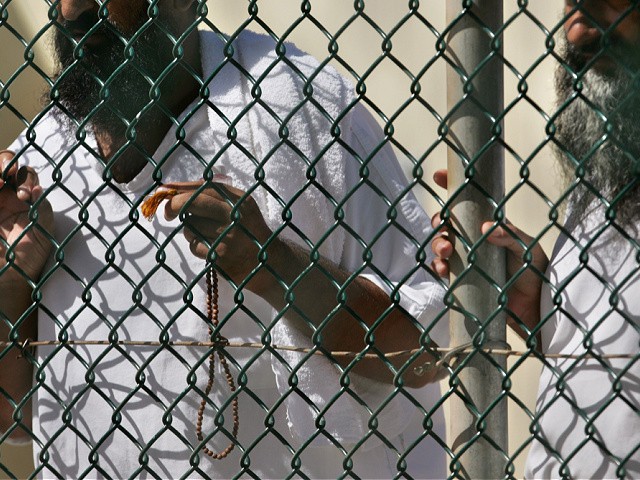
In this photo, reviewed by a US Department of Defense official, detainees stand together at a fence, one holding Islamic prayer beads, at Camp Delta prison, at the Guantanamo Bay U.S. Naval Base, Cuba (AP Photo/Brennan Linsley).
The White House initially denied the Journal report, calling it “not accurate,” then claimed the inaccuracy in the report was that the spy base was in the planning stages; it had already been there since 2019, an anonymous official claimed to the Associated Press, blaming the administration of former President Donald Trump.
In reality, retired Defense Intelligence Agency (DIA) counterintelligence research chief Chris Simmons told the Miami Herald such a base existed in Cuba since the era of President George H.W. Bush, whose family has a long and well-documented relationship with the Chinese Communist Party.
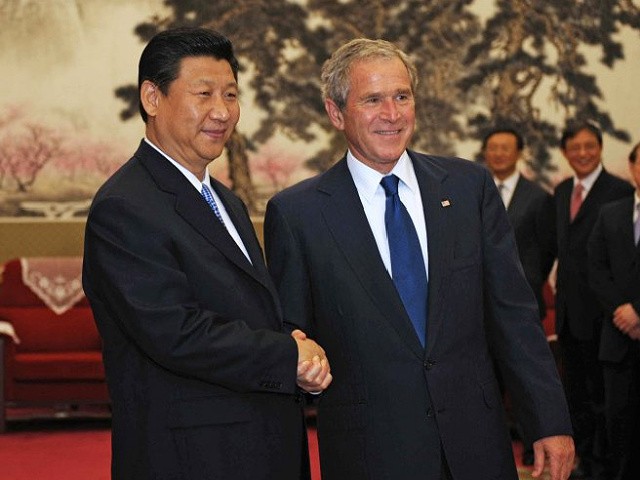
US President George W. Bush shakes hands with Chinese Vice President Xi Jinping (L) during a meeting in the Zhongnanhai compound in Beijing on August 10, 2008 (MANDEL NGAN/AFP via Getty Images).
The base, Simmons claimed, is located in Bejucal, a suburb of the greater Havana area.
“We saw the enhancements over a decade, a steady evolution; clearly something was going on, but we didn’t know what,” he explained, “And then, in 2001, we discovered that the Chinese had been there already for nine years. We were told at that time that when the Chinese arrived in 1992, they were embedded in a single building within Bejucal, and they were 50 officers in this facility.”
Simmons described the base as a “signals intelligence facility,” meaning a base to intercept American communications for espionage purposes, and claimed that U.S. authorities at the time dismissed the news because “the conventional wisdom was that China just seized the political opportunity because of the collapse of the Soviet Union” and Beijing was not worth any significant concern.
In 1992, the year Simmons claims American authorities believe that Chinese intelligence agents established a presence in Cuba, the administration of President George H.W. Bush was invested in a foreign policy of friendliness towards the brutal Chinese Communist Party – which had, barely three years prior, orchestrated the Tiananmen Square Massacre – in an attempt to convince Beijing to become democratic. President Bush promoted expanded commercial ties with China even in the aftermath of that massacre, on June 5, 1989.
“I happen to believe that the commercial contacts have led, in essence, to this quest for more freedom. I think as people have commercial incentive, whether it’s in China or in other totalitarian systems, the move to democracy becomes more inexorable,” the president said on the day after the massacre.
The Bush family’s relationship with family stems in part from business ties between President George H.W. Bush’s brother, Prescott Bush, and then-Shanghai Mayor Jiang Zemin, who went on to become president of China and the leader of Beijing’s operation to silence global disgust regarding the Tiananmen Square Massacre with lucrative business deals. Prescott Bush “closed a deal to build a golf club in Shanghai for foreign business executives” in 1989, multiple New York Times best-seller author and Breitbart News contributor Peter Schweizer revealed in his 2022 book, Red-Handed: How American Elites Get Rich Helping China Win. Prescott Bush became one of the loudest voices in America against sanctioning China for its human rights abuses. George W. Bush, who became president in 2001, presided over America as China joined the World Trade Organization (WTO) that year, the stepping stone Beijing needed for the global supply chain dominance it now enjoys.
The WTO membership was a long-term project under the younger Bush’s predecessor, President Bill Clinton, who also enjoyed warm relations with the Chinese Communist Party and took over half a million dollars in speaking fees from a Chinese business group while his wife, Hillary Clinton, served as secretary of state under then-President Barack Obama.
Cuba – despite being home to an extremely brutal human rights violating regime, being extremely hostile to U.S. interests, and serving as a stepping stone for foreign hostile regimes such as China, Russia, and Iran into the Western Hemisphere – was not a priority in the foreign policy of either Bush administration, the Clinton administration, or the administration of current President Joe Biden. Former President Barack Obama prioritized rewarding the Castro regime for its atrocities, visiting Cuba and doing “the wave” at a baseball game with murderous dictator Raúl Castro.
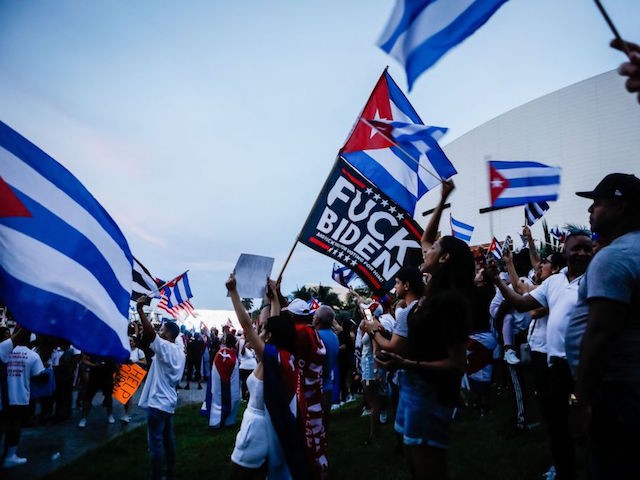
A person holds an anti-Biden flag as people wave Cuban and US flags during a Freedom Rally showing support for Cubans demonstrating against their government, at Freedom Tower in Miami, on July 17, 2021 (EVA MARIE UZCATEGUI/AFP via Getty Images).
President Donald Trump’s administration, in contrast, prioritized sanctions on the Castro regime and elevating the stories of Cuban political prisoners and the Cuban exile community at home. Limiting profits from America to the Castro regime, greatly expanded under Obama, during the Trump era resulted in a significant decline in politically motivated arrests and other human rights violations on the island.
The Biden administration nonetheless appeared to blame the Trump administration for the initial Wall Street Journal report in June on Chinese espionage in Cuba. The report claimed, citing anonymous sources, that China was offering billions of dollars to the impoverished communist regime on the island to build a “spy base.”
“Officials familiar with the matter said that China has agreed to pay cash-strapped Cuba several billion dollars to allow it to build the eavesdropping station, and that the two countries had reached an agreement in principle,” the newspaper alleged. “Officials declined to provide more details about the proposed location of the listening station or whether construction had begun.”
White House National Security Council Coordinator for Strategic Communications John Kirby, who was quoted in the original Wall Street Journal report, called the report featuring his own words “not accurate.”
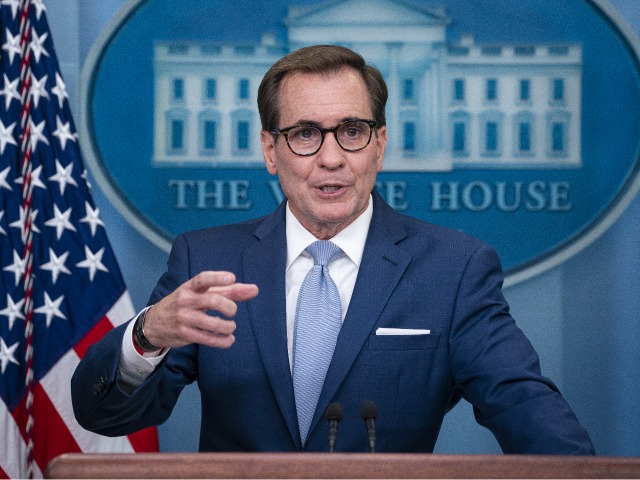
John Kirby, national security council coordinator, speaks during a news conference in the James S. Brady Press Briefing Room at the White House in Washington, D.C., US, on Tuesday, Aug. 2, 2022 (Al Drago/Bloomberg via Getty Images).
Another unnamed White House official reportedly told the Associated Press that the base already existed in Cuba as of 2019, when China reportedly conducted an “upgrade” on it. The official claimed the base was an “inherited” problem from the Trump era.
In a subsequent press conference, Kirby called it “shameful” that anonymous sources were informing the public of potential Chinese espionage activity 90 miles from U.S. soil.
“It’s shameful that somebody, or somebodies, somehow think it’s okay to put this kind of information in the public bloodstream,” Kirby scolded reporters, “Clearly, there’s a source or sources out there that think it’s somehow beneficial to put this kind of information into the public stream, and it’s absolutely not … Obviously, you and your bosses make the decision about whether you’re going to report on it.”
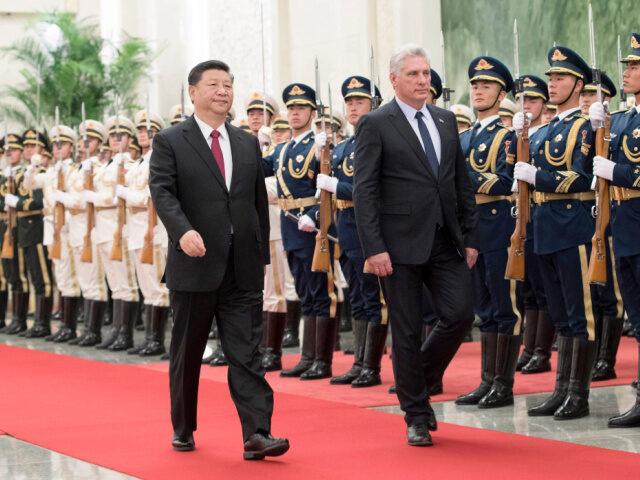
COMMENTS
Please let us know if you're having issues with commenting.